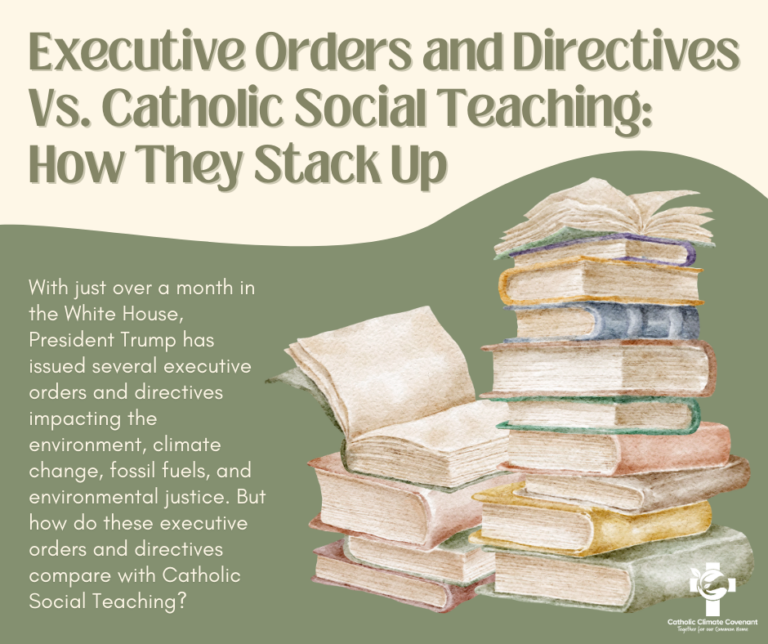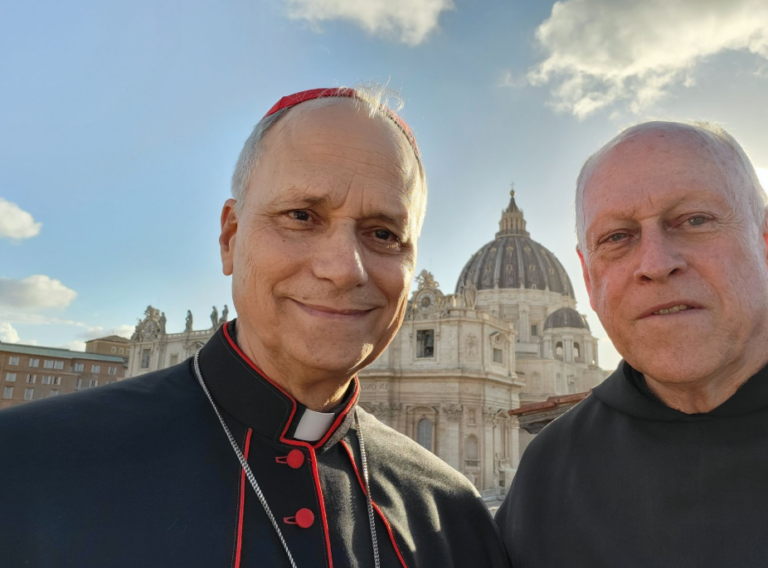We’ve created a short resource out of this updated blog for you to give to people in your community or insert into a bulletin. You can find that resource here.
With nearly two months spent in the White House, President Donald Trump has issued several executive orders and directives impacting the environment, climate change, fossil fuels, and environmental justice.
But how do these executive orders and directives compare with Catholic Social Teaching?
Catholic social teaching (CST) is the body of Church teaching that helps persons and communities discern how to love. Over the past 130+ years, modern CST has addressed social, economic, political, and environmental issues in light of the teachings of Jesus Christ and the Church’s understanding of human dignity, justice, and the common good. It’s rooted in the Church’s concern for the welfare of all people, particularly the poor and marginalized, and provides guidance on how to create a more just, equitable, and compassionate society.
CST is summarized in the Compendium of the Social Doctrine of the Church. At its core, CST is based on the belief that every human person is created in the image of God and has inherent dignity, which should be respected and upheld in all social and economic systems. The principles of CST emphasize both the rights of individuals and the collective responsibility to care for one another, the environment, and future generations.
Key Principles of Catholic Social Teaching:
- Dignity of the Human Person
- Every human being is created in the image of God and possesses inherent dignity. This is the foundational principle of CST, asserting that all people deserve respect, protection, and the opportunity to live a full, flourishing life.
- Rights and Responsibilities
- Rights are claims on “the basic goods that every human person needs to live and thrive” and include the right to life and “the right to a safe environment.” Responsibilities are obligations to protect and promote these rights. Rights and responsibilities are “inextricably connected,” and “those, therefore, who claim their own rights, yet altogether forget or neglect to carry out their respective duties, are people who build with one hand and destroy with the other.”
- Preferential Option for the Poor
- This principle emphasizes that we must prioritize the needs of the poor and marginalized in our social and economic systems–those most vulnerable to the violation of dignity and rights. It doesn’t mean that the rich or others in society are not important, but it challenges us to give special care to those who are most in need and whose voices are often overlooked.
- Common Good
- The common good refers to conditions that protect human dignity by safeguarding rights, fulfilling duties, and empowering all persons to flourish. It emphasizes social conditions that benefit everyone, especially the poor and vulnerable. It calls for a society in which people live in harmony, peace, and mutual respect.
- Solidarity
- Solidarity is a commitment to the common good based on the reality that we are all responsible for each other. It’s the idea that we are all part of one human family, regardless of nationality, ethnicity, or economic status. Solidarity calls for compassion and action in support of the poor, the oppressed, and the marginalized.
- Subsidiarity
- The state exists to protect and promote the common good. Subsidiarity holds that the state should do this at the lowest possible but highest necessary level possible. When voluntary activities protect rights and fulfill duties, the state should not intervene. However, if rights are persistently violated and duties are consistently unfulfilled, the state has a moral obligation to intervene at increasingly higher levels.
- Care for Creation
- This principle calls for responsible stewardship of the earth. It uses the term “integral ecology” to stress the intrinsic dignity of all creation and emphasizes that love of God and neighbor requires love of all creation. The Church thus emphasizes that creation care is “essential” to the Christian faith and teaches that we have a moral duty to care for the planet as God’s gift that sustains human life. The U.S. bishops especially emphasize that creation care must be guided by the best available science.
- Economic Justice
- CST calls for just economic systems that respect the dignity of the human person and ensure that all people have access to the resources they need to live a dignified life. This includes fair wages, access to work, and the elimination of unjust poverty. Economic systems should serve the human person, not the other way around. The Church “rejects the notion that a free market automatically produces justice.”
- Justice and Peace
- The Church teaches that justice is the protection of rights and fulfillment of responsibilities and that peace is the result of justice. True peace is not just the absence of conflict but the presence of right relationships, equity, and fairness. This includes working towards the resolution of conflicts and addressing the root causes of violence, such as poverty and inequality. As the Church stresses, “Peace, justice, and the preservation of creation are three absolutely interconnected themes, which cannot be separated and treated individually.”
Let’s take a closer look at President Trump’s environmental executive orders and directives and see how they clash with Catholic Social Teaching.
Executive Orders
Executive Order 14162: Withdrawal from the Paris Agreement (January 2025)
This order withdraws the U.S. from the Paris Agreement, which is a global effort to mitigate climate change and limit global temperature rise. The Catholic Church has consistently supported the goals of the Paris Agreement. St. John Paul II, Pope Benedict XVI, and Pope Francis all emphasize that climate change is an urgent moral issue that requires collective action.
Some Conflicts with CST:
- Care for Creation: The Church urges the global community to take action on climate change, particularly to reduce greenhouse gas emissions and protect the planet for future generations. By withdrawing from the Paris Agreement, this order undermines those efforts and negates international cooperation to protect the environment.
- Rights and Responsibilities: St. John Paul II asserted “the right to a safe environment,” which “the State also has the responsibility of ensuring.” Pope Benedict XVI stressed that ecological degradation violates the right to life: “How can we separate, or even set at odds, the protection of the environment and the protection of human life, including the life of the unborn?”
- Solidarity and the Common Good: CST stresses solidarity with the poor, who are disproportionately affected by climate change, even though they contribute the least to its causes. The U.S. withdrawal potentially harms poorer nations that are already struggling with climate-related disasters.
Executive Order: National Energy Emergency (January 2025)
This executive order declares a national energy emergency, prioritizing fossil fuel infrastructure development and suspending certain environmental reviews to fast-track fossil fuel projects. It is designed to increase domestic fossil fuel production and reduce regulatory barriers to projects like pipelines.
Some Conflicts with CST:
- Care for Creation: Integral Ecology: CST’s view of “integral ecology” emphasizes that human development must be in harmony with nature and science. The best available science indicates the need for increased energy efficiency and rapid transition away from fossil fuels to renewable energies. Expanding fossil fuel infrastructure and ignoring environmental reviews can lead to environmental degradation, which harms both the environment and marginalized communities.
- Preferential Option for the Poor: The expansion of fossil fuel projects often harms the poor, especially Indigenous communities and people living in areas that are most vulnerable to environmental degradation (such as those living near pipelines or refineries). These communities disproportionately and unjustly bear the brunt of environmental destruction and pollution.
- Care for Creation: The Church calls for an energy transition toward renewable sources that are sustainable, just, and clean. By prioritizing fossil fuels, this order contradicts the Church’s emphasis on moving toward cleaner energy sources.
Executive Order 14161: Rescission of Environmental Justice Initiatives (January 2025)
This executive order rescinds several key environmental justice initiatives that were implemented during the previous administration. These initiatives focused on addressing the disproportionate impact of environmental harm on marginalized communities, including people of color and low-income populations.
Some Conflicts with CST:
- Preferential Option for the Poor and Vulnerable: CST prioritizes the needs of the poor and marginalized. Rescinding environmental justice initiatives undermines efforts to protect communities that are disproportionately affected by environmental harm.
- Solidarity: CST calls for solidarity with communities that disproportionately suffer from environmental degradation. By rolling back these initiatives, the government is threatening persons’ rights to a safe environment and neglecting the duty to protect vulnerable populations.
- Dignity of the Human Person: CST affirms that all human beings have inherent dignity. Environmental policies that fail to protect the most vulnerable—who often face environmental racism and inequality—undermine this core principle.
UPDATED 5/7/25
Executive Order 14165: Elimination of Environmental Justice Programs (March 2025)
This executive order directs the Environmental Protection Agency (EPA) to dismantle all environmental justice and DEI (diversity, equity, and inclusion) programs. The administration has defended this action as an effort to remove “ideological bias” from government agencies.
Some Conflicts with CST:
- Dignity of the Human Person: CST affirms that every human being has inherent dignity. Eliminating programs that aim to protect vulnerable communities erodes that dignity, particularly when those communities suffer disproportionate environmental harm.
- Rights and Responsibilities: The Church teaches that people have a right to a safe environment and that the state is responsible for protecting it. This order diminishes that responsibility.
- Preferential Option for the Poor: Environmental justice programs are designed to support poor and marginalized communities. Dismantling them undermines the Church’s call to prioritize these groups.
Executive Order 14168: Fast-Track Fossil Fuel Permitting (April 2025)
This order accelerates approval processes for oil, gas, and coal infrastructure projects by suspending comprehensive environmental reviews under the National Environmental Policy Act (NEPA). The administration claims the order is intended to bolster energy independence.
Some Conflicts with CST:
- Care for Creation: CST calls for an “integral ecology” that harmonizes human activity with environmental stewardship. Fast-tracking fossil fuel projects without adequate review threatens ecosystems, air quality, and climate stability.
- Solidarity: The environmental consequences of these projects often fall disproportionately on low-income and Indigenous communities. CST requires solidarity with those communities, not policies that exacerbate their burden.
Common Good: Bypassing safeguards in pursuit of short-term energy goals does not promote conditions that allow all people to flourish, especially future generations.
Directives
General Services Administration (GSA) Shuts Down Electric Vehicle (EV) Charging Stations (February 2025)
The decision to shut down federal EV chargers goes against the growing global shift toward electric vehicles as a cleaner alternative to fossil fuels. It marks a rollback of federal support for electric transportation.
Some Conflicts with CST:
- Care for Creation and Sustainable Development: By cutting support for EV infrastructure, the U.S. government is not promoting more sustainable transportation options. CST calls for economic development that supports the well-being of both humanity and the environment. Moving away from fossil fuels and investing in electric vehicles is a key part of sustainable development.
- Common Good: The Church stresses the importance of technology being used for the common good, with a focus on reducing pollution and promoting sustainable practices. This action undermines those goals by reducing infrastructure for more eco-friendly transportation.
- Subsidiarity: Since the government exists to protect the common good and voluntary actions have not shifted markets away from fossil fuels, the government has a responsibility to intervene at increasingly higher levels.
Expansion of Offshore Oil Drilling (February 2025)
This directive involves expanding offshore drilling for oil and gas, which directly contributes to climate change and environmental destruction. The expansion of fossil fuel exploration and extraction can result in oil spills and habitat destruction, affecting marine life and coastal communities.
Some Conflicts with CST:
- Care for Creation: Pope Francis’ teaching on environmental protection stresses the need to reduce fossil fuel dependence and protect ecosystems. Expanding oil drilling threatens marine ecosystems, which are critical to biodiversity and the health of the planet.
- Option for Poor, Vulnerable, and Marginalized: Communities that depend on healthy oceans for their livelihoods, especially fishing communities and Indigenous peoples, are disproportionately impacted by oil drilling. CST calls for the protection of those most vulnerable to environmental harm.
- Economic Justice: The Church advocates for sustainable economic models that respect the planet’s natural limits. Expanding fossil fuel extraction contradicts this vision and promotes unsustainable growth.
UPDATED 5/7/25
Department of Energy Directive: Deprioritization of Renewable Energy (March 2025)
In a new directive, the Department of Energy deprioritized funding and permitting support for solar and wind energy projects in favor of traditional energy sources like oil, gas, coal, hydropower, and geothermal. While geothermal and hydropower are less carbon-intensive, solar and wind — which are central to global decarbonization goals — have been left out of the administration’s energy priority list.
Some Conflicts with CST:
- Care for Creation: Pope Francis has called for a swift transition to renewable energy. This directive slows such a transition, continuing reliance on pollutive energy systems.
- Common Good: Renewable energy supports the long-term health of the planet and equitable access to clean air and water. Undermining solar and wind expansion contradicts these goals.
- Subsidiarity: The government has a duty to act when lower levels of society cannot solve systemic issues like climate change. Removing federal support stalls necessary progress on sustainable energy.
EPA Cancellation of Environmental Justice Grants (April 2025)
The EPA announced the cancellation of nearly 800 grants — over $200 million in funding — including all environmental justice grants. These funds had been designated for projects such as climate resilience, pollution mitigation, and public health support in historically underserved communities.
Some Conflicts with CST:
- Preferential Option for the Poor: These grants directly benefited communities most impacted by environmental harm. Eliminating them removes support from those with the fewest resources to adapt or resist.
- Solidarity: CST insists on standing with the marginalized. This directive abandons that commitment and fails to uphold the moral obligation to protect the most vulnerable.
Economic Justice: These grants were also part of efforts to ensure just and equitable economic transitions in the face of climate change. Withdrawing them weakens those efforts and leaves disadvantaged communities behind.
All of these executive orders and directives (and many of the ones that aren’t explicitly environmental and subsequently aren’t included here) clash with Catholic Social Teaching by undermining key principles like care for creation, solidarity, the preferential option for the poor, and sustainable development. Pope Francis’ Laudato Si’ stresses that environmental degradation and climate change disproportionately affect the poorest and most vulnerable communities, making the Church’s stance clear on the need for environmental justice. The rollback of environmental protections, the prioritization of fossil fuels, and the failure to address climate change directly conflict with these deeply held Catholic values.
These actions stand in stark contrast to the moral teachings that urge us to protect the environment as a sacred duty and to pursue policies that prioritize the well-being of all, especially the most vulnerable.




